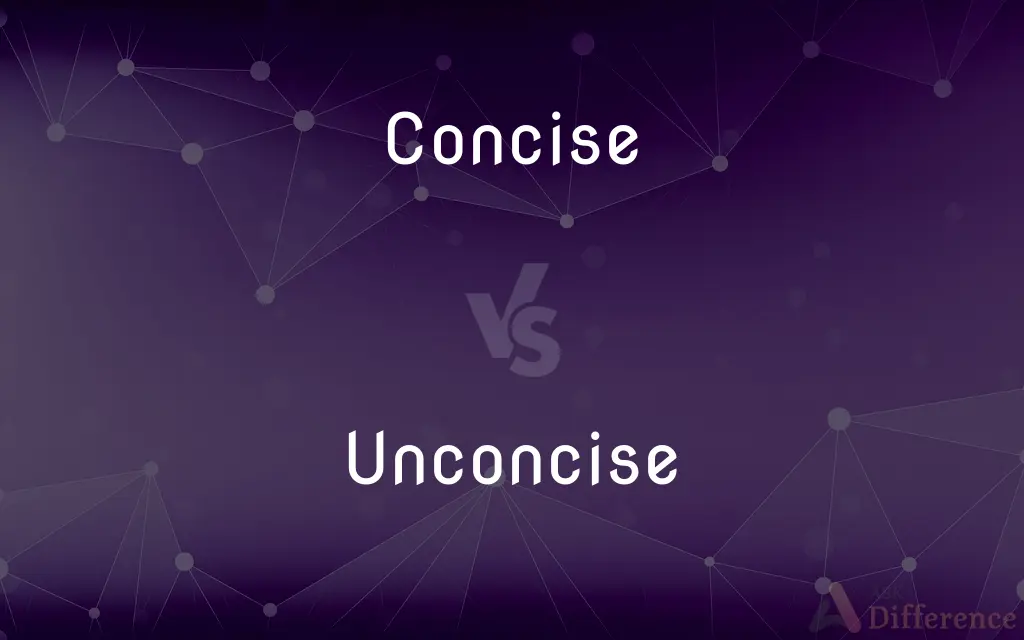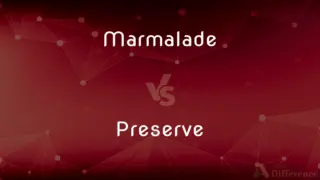Concise vs. Unconcise — What's the Difference?
Edited by Tayyaba Rehman — By Fiza Rafique — Updated on March 14, 2024
Concise communication is clear and to the point, using few words, whereas unconcise communication is more detailed and lengthy, often including redundant information.

Difference Between Concise and Unconcise
Table of Contents
ADVERTISEMENT
Key Differences
Concise writing or speech efficiently communicates an idea using the fewest possible words without sacrificing clarity. This style is appreciated in professional and academic settings for its directness and effectiveness. On the other hand, unconcise communication tends to include additional details, explanations, or redundancies, which can make the message longer and sometimes less clear. This approach may be useful in casual or artistic contexts where the richness of language enhances the experience.
In concise communication, every word serves a purpose, and there is a strong emphasis on avoiding redundancy. This conciseness helps readers or listeners grasp the main points quickly. Unconcise communication, however, might include repetitive statements or elaborations that provide more context but can also distract from the central message.
Conciseness is often achieved through careful editing and revision, where extraneous words are removed, and sentences are streamlined. Unconcise writing or speech might result from a lack of editing or a deliberate choice to explore a topic more thoroughly, sometimes at the risk of over-explanation.
The preference for conciseness or unconciseness can depend on the audience's expectations and the context. Technical and business fields usually favor conciseness for its efficiency and clarity, whereas literary or expressive contexts might welcome a less concise style that allows for more descriptive and nuanced expression.
Effective communication can be achieved through both concise and unconcise styles, depending on the objective. Conciseness is key when the goal is to convey information quickly and clearly, while a more unconcise approach might be suitable for engaging the audience's imagination or providing comprehensive insights into a subject.
ADVERTISEMENT
Comparison Chart
Word Count
Minimal, only necessary words used
Higher, includes additional details
Clarity
High, due to lack of extraneous information
Can be lower, due to additional information
Purpose
Quick and clear communication
Detailed exploration or explanation
Editing
Rigorous, with a focus on trimming
Less strict, allows for expansion
Preferred Contexts
Professional, academic
Casual, artistic
Compare with Definitions
Concise
Expressing much in few words.
Her concise summary captured the essence of the argument.
Unconcise
Not brief or to the point.
Her unconcise explanation confused more than it clarified.
Concise
Brief and to the point.
His concise reply answered all questions.
Unconcise
Characterized by redundancy.
The document was unconcise, filled with repetitive information.
Concise
Efficient in expression.
The report was concise, yet informative.
Unconcise
Lacking efficiency in expression.
His unconcise speech went over the allotted time.
Concise
Lacking unnecessary detail.
She gave a concise overview of the plan.
Unconcise
Including many details or elaborations.
The unconcise article covered every aspect of the event.
Concise
Streamlined communication.
He is known for his concise emails.
Unconcise
Expansive in communication.
Her unconcise writing style is rich in descriptions.
Concise
Concise is a municipality in the district of Jura-Nord Vaudois in the canton of Vaud in Switzerland.
Unconcise
Not concise.
Concise
Giving a lot of information clearly and in a few words; brief but comprehensive
A concise account of the country's history
Concise
Expressing much in few words; clear and succinct.
Concise
Brief, yet including all important information
Concise
(obsolete) Physically short or truncated
Concise
To make concise; to abridge or summarize.
Concise
Expressing much in a few words; condensed; brief and compacted; - used of style in writing or speaking.
The concise style, which expresseth not enough, but leaves somewhat to be understood.
Where the author is . . . too brief and concise, amplify a little.
Concise
Expressing much in few words;
A concise explanation
Common Curiosities
Can unconcise communication be effective?
Yes, in contexts where detail and nuance are valued, unconcise communication can be quite effective.
Do all professions require concise communication?
While many do, some fields appreciate or even require more detailed, unconcise expression.
Does conciseness affect readability?
Yes, conciseness often improves readability by eliminating clutter and focusing on key points.
Is conciseness always the goal in communication?
Not always; the goal depends on the context and the audience's needs.
Can a long document be concise?
Yes, if it communicates complex information efficiently and without unnecessary detail.
Are there tools to help write concisely?
Yes, various editing tools and techniques can help identify and eliminate unnecessary words.
How do I decide between concise and unconcise communication?
Consider your audience, purpose, and context to determine which style is more appropriate.
How can I make my writing more concise?
Eliminate redundant words, use precise vocabulary, and focus on the essential message.
What makes a communication concise?
Concise communication is marked by brevity and the efficient use of words.
Is concise communication more difficult to achieve?
It can be, as it requires careful word choice and the elimination of unnecessary details.
Can unconcise writing be clear?
Yes, with careful organization and clear logic, unconcise writing can also achieve clarity.
What role does editing play in achieving conciseness?
Editing is crucial, focusing on removing superfluous elements and clarifying the message.
How does culture affect preferences for conciseness?
Cultural backgrounds can influence whether people prefer concise or more detailed communication styles.
Can visual elements contribute to conciseness?
Yes, visual elements can convey complex information quickly and efficiently, complementing concise text.
Does the digital age favor concise communication?
Generally, yes, due to shorter attention spans and the abundance of information available.
Share Your Discovery

Previous Comparison
Marmalade vs. Preserve
Next Comparison
Mart vs. MarketAuthor Spotlight
Written by
Fiza RafiqueFiza Rafique is a skilled content writer at AskDifference.com, where she meticulously refines and enhances written pieces. Drawing from her vast editorial expertise, Fiza ensures clarity, accuracy, and precision in every article. Passionate about language, she continually seeks to elevate the quality of content for readers worldwide.
Edited by
Tayyaba RehmanTayyaba Rehman is a distinguished writer, currently serving as a primary contributor to askdifference.com. As a researcher in semantics and etymology, Tayyaba's passion for the complexity of languages and their distinctions has found a perfect home on the platform. Tayyaba delves into the intricacies of language, distinguishing between commonly confused words and phrases, thereby providing clarity for readers worldwide.















































